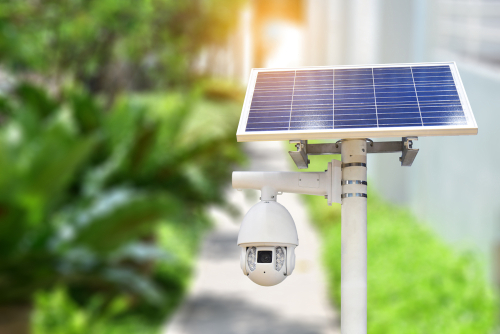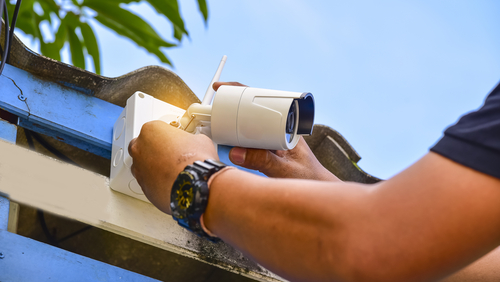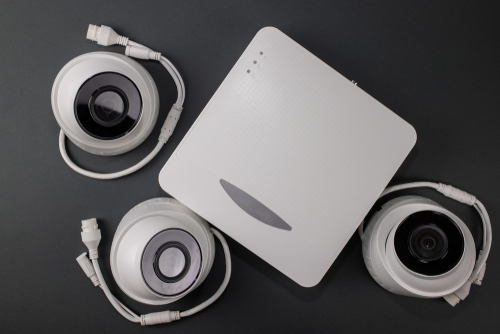
Guide to Choosing Home CCTV Cameras for Pet Owners
August 22, 2023
CCTV in Art Galleries: Protecting Cultural Treasures
November 17, 2023The Advantages of IP Cameras for Home Security
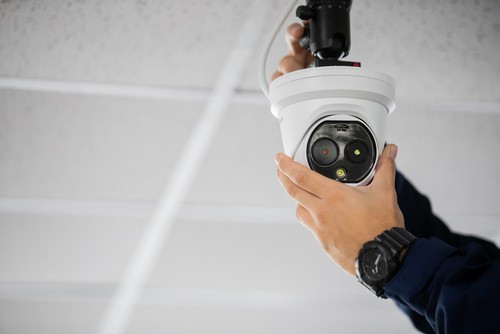
The Advantages of IP Cameras for Home Security
The Advantages of IP Cameras for Home Security. Home security is a growing concern in today’s world.
With the rise in crime rates and the need for constant vigilance, many homeowners are turning to innovative solutions to protect their loved ones and property.
One such solution is the use of IP cameras, which have revolutionized modern home surveillance.
This article delves into the world of IP cameras, offering a comprehensive overview of their advantages and how they can enhance your home security.
Understanding IP Cameras
What Are IP Cameras?
In essence, IP cameras, or Internet Protocol cameras, are digital video cameras that transmit data over a network, such as the internet.
These cameras come with various features that make them stand out in the realm of home security.
How IP Cameras Differ from Traditional CCTV
1. Digital vs. Analog
One of the fundamental distinctions between IP cameras and traditional closed-circuit television (CCTV) systems is that IP cameras operate digitally.
This means they capture and transmit video in a digital format, resulting in higher image quality and flexibility.
2. Network Connectivity
IP cameras are also known for their network connectivity. They can be accessed remotely via the internet, allowing homeowners to monitor their property from virtually anywhere with an internet connection.
High-Quality Video

Importance of Clear Video Footage
Having clear, high-quality video footage is crucial for effective home security.
IP cameras excel in this department, providing sharp and detailed images that make it easier to identify potential threats or incidents.
Benefits of High-Resolution IP Cameras
Modern IP cameras offer high-resolution video, often in 1080p or even 4K. This level of detail ensures that you don’t miss any important information in your surveillance recordings.
Night Vision Capabilities
Many IP cameras come equipped with infrared (IR) technology, which enables them to capture images in low-light or complete darkness. This is an invaluable feature for 24/7 surveillance.
In addition to IR technology, IP cameras have advanced low-light performance, ensuring that your security system remains effective even during challenging lighting conditions.
Remote Monitoring
Accessing Your Home from Anywhere
The ability to access your home’s security system from anywhere is a game-changer. IP cameras allow you to monitor your property, loved ones, and belongings remotely, offering peace of mind even when you’re far from home.
Mobile Apps and Remote Viewing
Most IP camera systems offer dedicated mobile apps that make it incredibly easy to check in on your property using your smartphone or tablet.
These apps are user-friendly and enable you to view live or recorded footage effortlessly.
Cloud Storage for Footage Access
Many IP camera systems offer cloud storage solutions, ensuring that your video footage is securely stored and accessible from anywhere with an internet connection.
This eliminates the need for physical storage devices and the risk of data loss.
Two-Way Communication
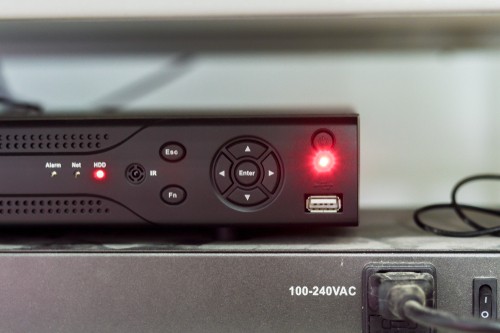
Interacting with Family and Visitors
IP cameras often come with built-in two-way communication features, allowing you to converse with family members or visitors when you’re away from home. This feature enhances the overall security of your home and can be incredibly convenient for daily use.
Potential Deterrence for Intruders
The knowledge that you can communicate with potential intruders in real-time can be a powerful deterrent. Criminals are less likely to target a property with visible two-way communication capabilities.
Emergency Communication
In emergency situations, IP cameras can be used to call for help or provide vital information to first responders. This feature can be a lifesaver in critical moments.
Easy Installation and Setup
DIY Installation Options
For tech-savvy homeowners, many IP camera systems offer do-it-yourself (DIY) installation options. These kits come with detailed instructions, making it relatively straightforward to set up your security system.
Professional Installation Services
Alternatively, if you’re not comfortable with DIY installation, you can opt for professional installation services. These professionals ensure that your cameras are correctly positioned and configured for optimal performance.
Connecting to Your Home Network
IP cameras can be seamlessly integrated into your home network, whether wired or wireless. This connectivity ensures that you can access your cameras and footage effortlessly.
Indoor and Outdoor Surveillance
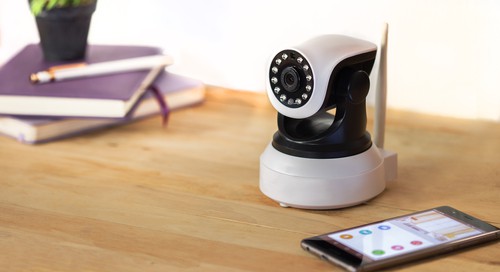
Surveillance Inside the Home
1. Nanny Cams and Child Monitoring
IP cameras are ideal for monitoring indoor spaces. They can be used as nanny cams to keep an eye on childcare providers or as general child monitors, ensuring your children are safe and well-cared for.
2. Pet Surveillance
Pet owners can use IP cameras to check on their furry friends when they’re away. This provides peace of mind and entertainment, as you can interact with your pets remotely.
Securing the Perimeter
1. Weatherproof Outdoor IP Cameras
Outdoor IP cameras are designed to withstand the elements. They are weatherproof and can endure harsh conditions, ensuring your property’s exterior is constantly monitored.
2. Protection Against Vandals
Outdoor IP cameras act as a deterrent to potential vandals and intruders. The mere presence of these cameras can protect your property and discourage criminal activity.
Integration with Smart Home Systems
Compatibility with Smart Home Devices
IP cameras can seamlessly integrate with other smart home devices, such as smart locks and sensors. This integration enhances your overall home security system.
Seamless Integration with Home Automation
By integrating your IP cameras with home automation systems, you can set up custom alerts and actions. For example, your lights can turn on when motion is detected, further enhancing security.
Enhanced Security through Integration
The synergy of IP cameras and smart home systems results in a more comprehensive and responsive security solution. Your home can adapt to different situations and respond to potential threats effectively.
Cost-Effective Home Security
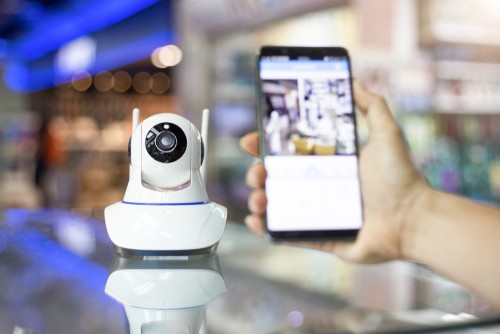
Upfront Costs
1. IP Camera Pricing
While IP camera systems may have higher upfront costs compared to traditional CCTV, the advantages they offer are well worth the investment.
2. Installation Expenses
Consider the installation expenses, whether you choose DIY or professional installation. These costs are a crucial part of your overall investment.
Long-Term Savings
1. Reduced False Alarms
IP cameras are less prone to false alarms due to their high-quality video and intelligent motion detection. This can save you from unnecessary panic and police dispatches.
2. Insurance Discounts
Many insurance companies offer discounts to homeowners with advanced security systems in place. Installing IP cameras can lead to reduced insurance premiums over time.
Privacy and Data Security
Protecting Your Privacy
IP camera manufacturers prioritize your privacy by implementing robust security features. Ensure that your cameras are password-protected and regularly update your login credentials.
Ensuring Secure Data Transmission
IP camera systems use encrypted connections to transmit data, safeguarding your footage from potential eavesdropping or interception.
Password and Authentication Best Practices
Follow best practices for password management and authentication to further protect your security system from unauthorized access.
Choosing the Right IP Camera for Your Home
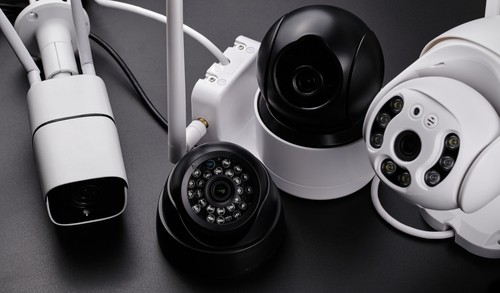
Assessing Your Specific Security Needs
Consider your specific security needs when choosing an IP camera system. Evaluate factors like the size of your property, the desired coverage, and your budget.
Customization and Scalability
IP camera systems offer various models and accessories, allowing you to customize your security setup according to your unique requirements. You can scale your system as needed.
Consultation with Security Experts
If you’re uncertain about the best IP camera solution for your home, consult security experts who can provide tailored recommendations.
Frequently Asked Questions (FAQs)
Are IP cameras vulnerable to hacking?
IP cameras can be vulnerable if not properly secured. However, by following best security practices, you can minimize this risk.
How much internet bandwidth do IP cameras require?
The required bandwidth depends on factors like video quality and the number of cameras. Generally, a standard home internet connection should suffice.
What happens to video footage in case of a power outage?
Many IP cameras have backup power sources and can continue recording during power outages. Check your camera’s specifications for details.
Can IP cameras work with existing security systems?
Yes, IP cameras can often be integrated with existing security systems, providing additional layers of protection.
How often should I check and update my IP camera’s firmware?
Regularly checking and updating your IP camera’s firmware is crucial to ensure the latest security patches and features are in place.
The Advantages of IP Cameras for Home Security – Conclusion
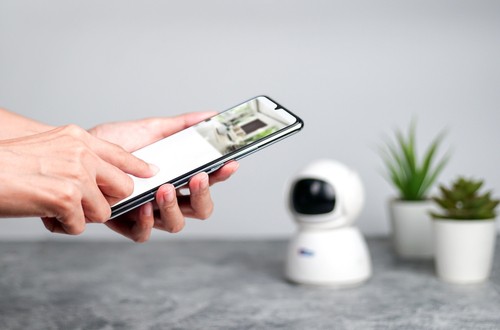
In conclusion, IP cameras offer many advantages for enhancing home security.
With their high-quality video, remote monitoring capabilities, and integration with smart home systems, these devices have become indispensable tools for safeguarding your family and property.
By understanding your security needs and following best practices, you can maximize the benefits of IP cameras and enjoy peace of mind like never before. Invest in the safety of your home with IP cameras today.
Are you seeking professional and reliable CCTV installation services in Singapore? Contact us today!

